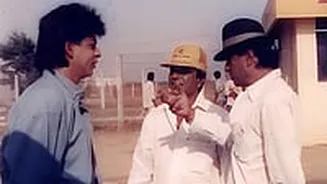Thriller masters Abbas-Mustan, easily the most successful director-duo in Hindi cinema, have had a very significant two-film association with Shah Rukh Khan, who turns 60 on November 2.
In a freewheeling
chat on the King Khan, the two are, as always, unanimous about their opinions, even completing each other’s sentences on speakerphone, which we will condense as a ‘single’ quote by Abbas-Mustan!
Excerpts from the interview:
Shah Rukh Khan celebrates 60 years on November 2. To come forward, have you watched his son, Aryan Khan’s debut directorial series, Ba***ds of Bollywood?
We haven’t, but we have heard a lot of positive things about it. We are busy with the final edit and BGM of our film, Kis Kis Ko Pyaar Karoon 2 and plan to catch up soon with the show. We have heard that the boy is very good and extremely down-to-earth, just like his father!
To go back, how did you first met Shah Rukh Khan?
The scripting of our film was going on at a flat rented by our producers, Venus Records and Tapes, and Shah Rukh had come there to meet a filmmaker. We met him then, and when he was introduced to us, he raved about how much he had loved our work in Khiladi.
How did you cast him in Baazigar?
We were contemplating on Anil Kapoor for that role. But he openly expressed hesitation about doing such a character when he was successful in positive roles. We then approached Salman Khan, but he too had reservations as his image was completely different.
Then the late actor Amrit Patel, who had worked with Shah Rukh in Fauji and Circus, told us to check him out. The boy is good, he said, so we had a formal meeting through Venus. We had watched Deewana then and had also liked him and felt that he would suit the role.
What was his response?
Shah Rukh came to our sitting-room and we instructed our writers Robin Bhatt and Javed Siddiqui to give him a narration, as we always did with our actors. But Shah Rukh insisted that the narration come from “our mouths (Aap ke munh se sunna chahata hoon)!” In vain, we said that we were not good at all in telling a story verbally. But he explained that only a director could communicate his complete vision to an actor. “I will understand the mental state of my character, and the flow of the story best from you! Never mind if you feel you are not as good as your writers!” he told us.
He was already a star, but even as we were sitting on chairs, he sat on the floor and listened with full concentration. When we finished, he just said, “I am doing this film! It’s a challenge for me!”
What would you say was his special quality as an actor?
Though he is a director’s actor and listens to us faithfully, his discussion with us was unique. When we gave him a scene, he told us that he could perform it in four or five different ways and actually did so. We had to choose what we thought was the best! This was a delight for us as we would have to show other actors what we wanted from them! A special way he made his mark was also in that scene in which he finally removes his lens and says, “Madan Chopra! Main aa raha hoon!” Until then, he had given the perfect idea that there were two people—the one who threw Shilpa Shetty off the terrace and the other a sweet young man.














